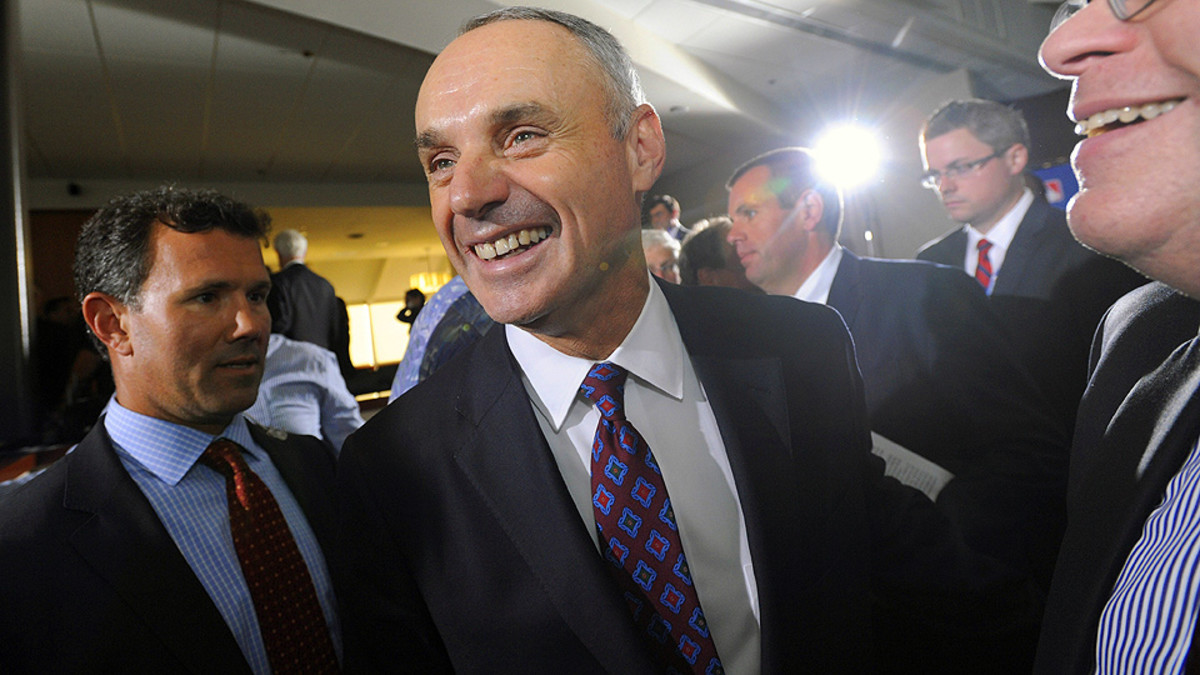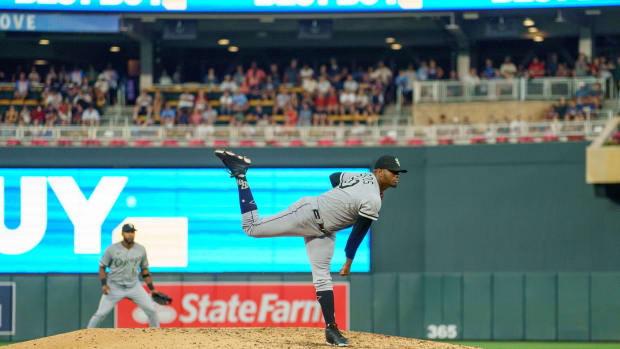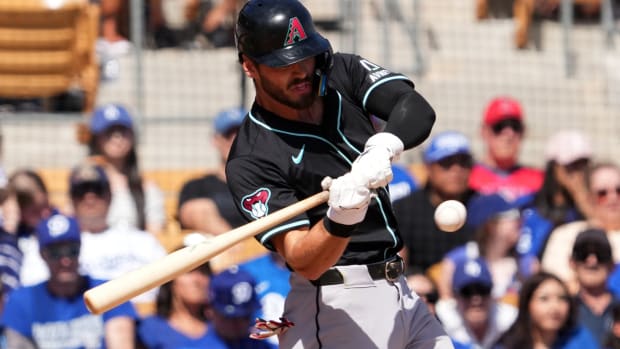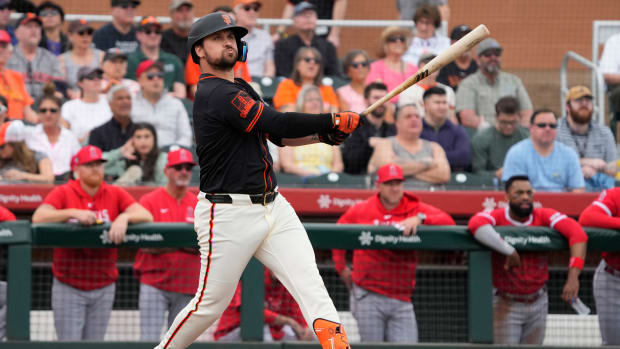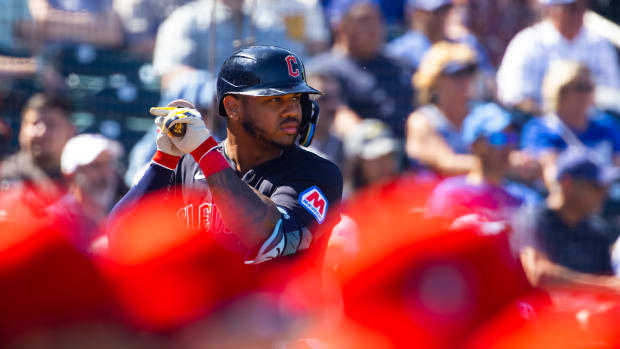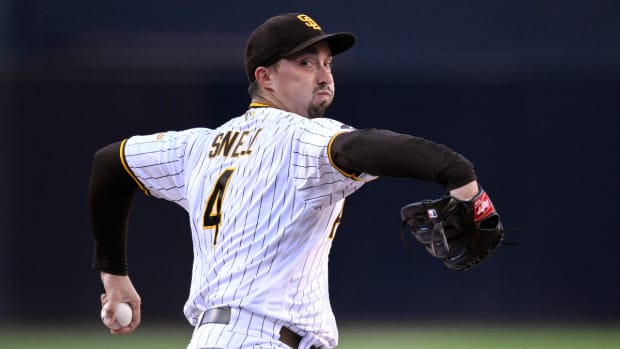Exclusive: Q&A with new MLB commissioner Rob Manfred
On the day after he was elected the 10th commissioner of baseball last week, Rob Manfred was handed a stack of index cards and 20 different pens by Howard Smith, senior vice president of licensing for MLB, and told to sign his name. The imprint of one of those signatures will be on the official major league baseballs next season.
“What we did establish is one thing,” Manfred said. “Among my strengths is apparently not penmanship.”
Manfred, 55, will inherit from Bud Selig a robust game with strong financials, stable attendance, labor peace and competitive balance. But he also inherits the warning signs of an aging fan base and more dead time within what are the longest games in the history of the sport. In his first exclusive interview as the commissioner-elect, Manfred spoke to SI.com Wednesday about the challenges that await him. Among the topics he addressed, Manfred promised to keep the pace of game issue “on the front burner,” strongly defended his office’s tactics in the 2013 Biogenesis investigation and explained how the implementation of instant replay this year could provide a road map for other changes.
SI: You've worked next to Bud Selig for 20 years. What are the most important lessons you've learned from him about how to best do this job?
RM: I think the most important thing I’ve learned from Commissioner Selig is it’s absolutely crucial to maintain a consensus among the clubs. He has built a tradition of unity among the clubs over the last 22 years that is amazing. And he has encouraged me to continue the process of openly communicating with the clubs in order to keep that consensus together.
SI: What strengths about yourself did you emphasize in your 50-minute presentation to owners in Baltimore last week?
The expected choice, Rob Manfred is elected the new MLB commissioner
RM: I emphasized the fact that particularly in the last four or five years Commissioner Selig has given me the opportunity to work on projects that cut all across the various substantive areas, not just labor but broadcasting, RSNs [regional sports networks], ownership transfers, financial instability in clubs … I emphasized the fact that that experience had broadened my personal expertise and had given me an opportunity to demonstrate leadership skills with the clubs.
The second big point that I made was about my strong relationship with labor throughout my entire career in baseball. I think it’s important to remember that the game is about the players and the ability to deal with players and the MLBPA is an important part of the skill set.
SI: You first began working with MLB as an outside counsel in 1987. What were your interests in baseball as a fan prior to that?
RM: I grew up a Yankees fan. I was born in upstate New York. Because of the proximity to Syracuse University, we were one of the first areas to have cable television. So we actually had access to both Met and Yankee games all while I was growing up. My dad is a huge Yankee fan to this day. My mom and dad brought my brother and my sister and I down to Yankee Stadium to see our first game in 1968. Really, a great family experience. I mean, something all of us have very fond memories about.
So I was just a big baseball fan. It never occurred to me that I would work in the game, to tell you the truth. I was laughing about this earlier today. I was a summer associate at a law firm in Philadelphia in the summer of ’81 and I went to the Phillies game the night before the strike. It was right when Pete Rose was chasing some record. It wasn’t the hit record. It might have been the National League one. I remember going to this game and the next couple of days the papers were filled with news about the strike. And I remember telling the guys I worked with, ‘I prefer my sports and my labor relations to be kept separate.’ I wasn’t really thinking about working in the game, I was just a big fan.
SI: You've been credited with helping to maintain an unprecedented run of labor peace with the players association. What challenges do you foresee in the next round of negotiations in 2016?
RM: I think the ‘16 negotiations will be different and challenging because of the change in personnel -- really, on both sides. And obviously I’m going to be deeply involved. Dan Halem [MLB's executive VP of labor relations] is going to have an expanded, full and significant role in the process. And obviously on the MLBPA side, I’ve known [executive director] Tony [Clark] a very long time and worked with him. But for both Tony and me it’s going to be a huge change not having [recently deceased union chief] Michael [Weiner] there. That will make it different this time
SI: You were chosen by owners to replace Bud Selig as commissioner. Will you appoint a new COO to fill the role you currently have, and how might that affect your role as MLB's point person in labor negotiations?
RM: All I’m prepared to say to you on that topic at this point is I’m sure there will be changes in the organization. Whether or not there is another COO right away, it’s just too early. You know, I have a very strong group in New York. You know, Dan Halem, Bob Bowman, Tony Pettiti, Joe Torre … a really strong group to work with. I’m going to have to shore out exactly how they’re going to fit together.
As new commissioner, Manfred to face challenges with labor, PEDs
SI: You gained both acclaim and criticism for how MLB handled its investigation of the Biogenesis PED scandal. What procedural lessons do you draw from the methods baseball used in that investigation?
RM: Let me be clear about one thing first. Everything that we did in the Biogenesis investigation, all the tactics we used, were vetted with outside counsel in advance and were legal. I know some of the lawyers involved on the other side of the case have a different view of the world. I’m very comfortable with the notion that absolutely everything we did was legal.
In terms of lessons I’ve learned, the lesson is this is another area where baseball is held to a very, very high standard. In other words, the fact that it’s legal did not put some of the questions about our tactics to bed. And I’ll tell you, I think that’s a very difficult standard to hold baseball to. On the one hand everyone insists that we do everything humanly possible to make sure that we don’t have performance enhancing drugs in the game. On the other hand they say, we recognize you don’t have police power, but we also want to make sure that beyond not having police power that the tactics you use are not just legal but better than legal. I think that’s a tough combination of expectations in sports.
SI: Tom Werner, the runner-up to you in the voting, spoke in detail about addressing pace-of-game issues, floating ideas such as a pitch clock and limits to mound visits. What emphasis do you believe is needed on this issue?
RM: Pace of game is not a new issue for us. Commissioner Selig has been on this issue for years. All of the [commissioner] candidates talked about pace of game. I think it is going to be a big area of emphasis in order to keep baseball competitive in the entertainment market. I think there are a number of facets to it. There is the pace of what goes on on the field, there’s the absolute time, the length of the game, there’s the amount of action in the game and there’s also what do we do in the ballpark and in our broadcast to fill in the parts of the game that some people find to be a little slower. So I think it’s a multi-faceted issue that’s going to stay on the front burner.
SI: Boston owner John Henry said before your election, "Baseball in 2014 needs, in addition to a commissioner, a real CEO who is intently focused on forcing the sport to compete in a world that more and more belongs to those who can create, adapt, build and execute in a transformed entertainment world." Do you agree with his concern for baseball as an entertainment option?
RM: I think that baseball faces, like all sports, a very competitive entertainment marketplace. Having said that, I think baseball has tremendous advantages that will allow it to compete in that marketplace. Everybody knows how important content is today. We’ve got 2,430 games, which is just a massive amount of live content, which is very appealing to consumers. We have a tremendous digital asset in MLB.com that I think that positions baseball not only to give fans access today but to be responsive to changes in technology and in the way that games are delivered to fans. We have a great asset in the MLB Network, a cable mode, a distribution mode, that has tremendous value, and I think the networks of our RSNs gives us a breadth of distribution at the local level that is really unrivaled among sports. So while it is competitive out there, I think we are well-armed to face that competition.
SI: Despite robust revenues in the game, baseball's core audience is aging and fewer children are playing the game. What challenge does that trend present you?
RM: Look, Commissioner Selig has been working on the issue of youth participation for a number of months. It’s a particular interest of mine. That’s why I’m going to Williamsport today. I think that it’s crucial that we make sure that amateur baseball is structured in a way that encourages and grows the number of young people that are playing the game because I believe that’s the key to creating fans, which all the research shows. We’re having very positive dialogue with all of the actors on what I think of as the youth side of the market, beginning with Little League all the way up through the Pony League right up to the NCAA. I think it’s important that we work on certain structural issues in amateur baseball to make sure we have kids playing the game. It’s a huge issue for us.
The other thing I would say about the older demographic is that there is opportunity there as well. Another important way that you build fans is you need to get kids in the ballpark young. The younger they go the more likely it is that they become avid fans. What I would say to you is that our older demographic is perfectly positioned to take their kids and their grandkids to ballparks and start the process of building new fans. So while it is an older demographic it’s a demographic that provides us with a great opportunity.
SI: What are you most looking forward to as commissioner of baseball?
RM: I’m very excited about the continued modernization of the game consistent with its historical roots. The instant replay process was probably one of the most exciting change processes that I’ve been involved in. I think it was successful in that it improved the quality of the game, it addressed a concern that people who play the game and our fans had of getting calls right, and at the same time we’ve managed to pull it off without altering any of the historical fundamentals of the game. And as a sidelight, we improved the product in the ballpark and on the field because we are letting people see a lot more of those exciting plays that they want to see. That kind of process really excites me and is the sort of process you need to apply to issues like the pace of the game.






























